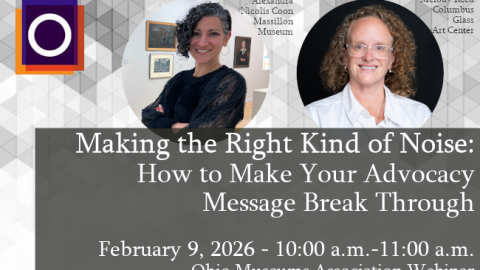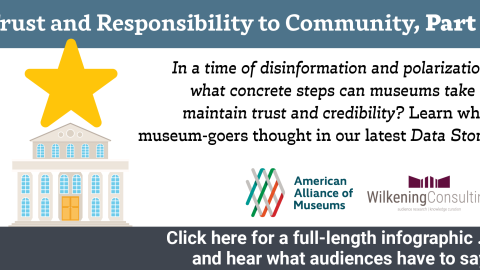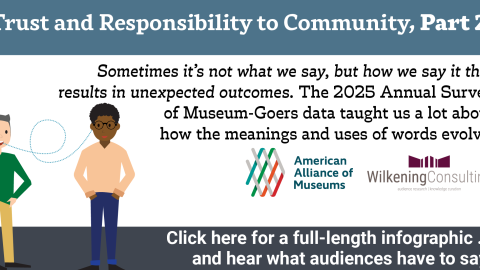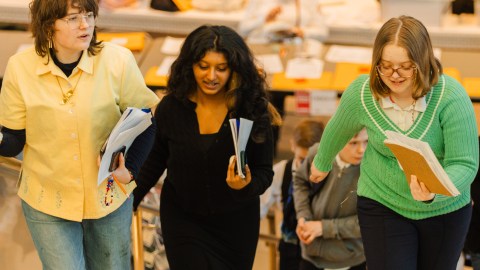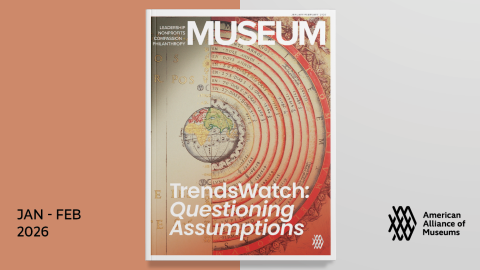
This week I’m buoying my spirits by making a list of content providers for whom I am grateful. (And following up on that gratitude with donations because, not surprisingly, their good work depends on public support.)
Today on the blog I’m sharing three organizations from that list, with encouragement for you to follow their work and a gentle nudge to contribute, if you are able. Realizing, of course, that a huge number of nonprofits are in dire need of financial support and we all pitch in where we can.
Happy Thanksgiving, with gratitude for your good work.

Elizabeth Merritt, Vice President, Strategic Foresight and Founding Director, Center for the Future of Museums. American Alliance of Museums
The Wikimedia Foundation
Twenty-five years ago, internet pioneers Jimmy Wales and Larry Sanger launched a free online encyclopedia written and maintained by volunteer “Wikipedians.” At first, I was hesitant to use this new site as a go-to source of information, because it seemed a bit like a lazy shortcut for research. But as my newsfeeds become ever more choked with hysteria, misinformation, and AI-generated content, Wikipedia remains a bastion of high-quality, carefully vetted, human-researched information. In an era of what Cory Doctorow has dubbed the “enshittification” of the internet, driven by corporations prioritizing profit, Wikipedia and its sister sites continue to live up to the early promise of the internet as a place to democratize the creation of and access to content. It’s not perfect—the overwhelming majority of wiki editors are white, male, and from developed countries—but their ranks are open, and diversifying over time. Many museums now host wiki “edit-a-thons” to make their information more accessible and fill gaps in the existing record. (This past March the National Museum of Women in the Arts held an edit-a-thon to upload content related to gender, feminism, and the arts, and the Smithsonian American Women’s History Museum held one to make women’s history “more discoverable online.”)
So next time you need summary of a topic, with links to sources, consider using Wikipedia rather than the AI-generated overview at the top of your search results. Next time you need a copyright-free image, mine Wikimedia Commons for one with an appropriate license rather than asking an AI image generator to create a facsimile. And consider contributing to the Wikimedia Foundation to support an open, democratic, community-supported source of credible information.
The Guardian
Sometimes distance provides perspective, and I often find that the coverage this British organization provides of US events is a bit more measured (read: less hysterical) than American coverage. On politics, The Guardian is rated by some arbiters as “center-left,” but I think that describes its take on UK government affairs more strongly than its US reportage. (Feel free to disagree.) It regularly features excellent articles on science, culture, and the arts, including museum news. The economic model for journalism is precarious, and many major newspapers are dependent on the deep pockets (and the agendas) of wealthy owners. Small donors are increasingly important to fund independent, investigative journalism with no strings attached. With that in mind, consider becoming a supporter of The Guardian.
Radiotopia
Podcasts are my happy place—a source of information, inspiration, and stress relief while I walk, drive, or exercise. However, podcasting rarely provides a stable income for creators. And I admit it can be hard to figure out how to fairly compensate podcasters for their work—surely it matters whether I listen to a single episode, a few, or am a regular listener? Happily, the Radiotopia network hosts many of the independent podcasts that simply bring me joy: Articles of Interest, Ear Hustle, The Kitchen Sisters Present, Home Cooking, Hyperfixed. (And archived episodes of some favorite podcasts that have ended, including Everything is Alive and Benjamin Walker’s Theory of Everything.) By donating a lump sum to Radiotopia, I can support these and other excellent productions.
Your Turn
I’d love to know what organizations, and creators, you are grateful for, and recommend supporting. Please share in the comment section, below.



